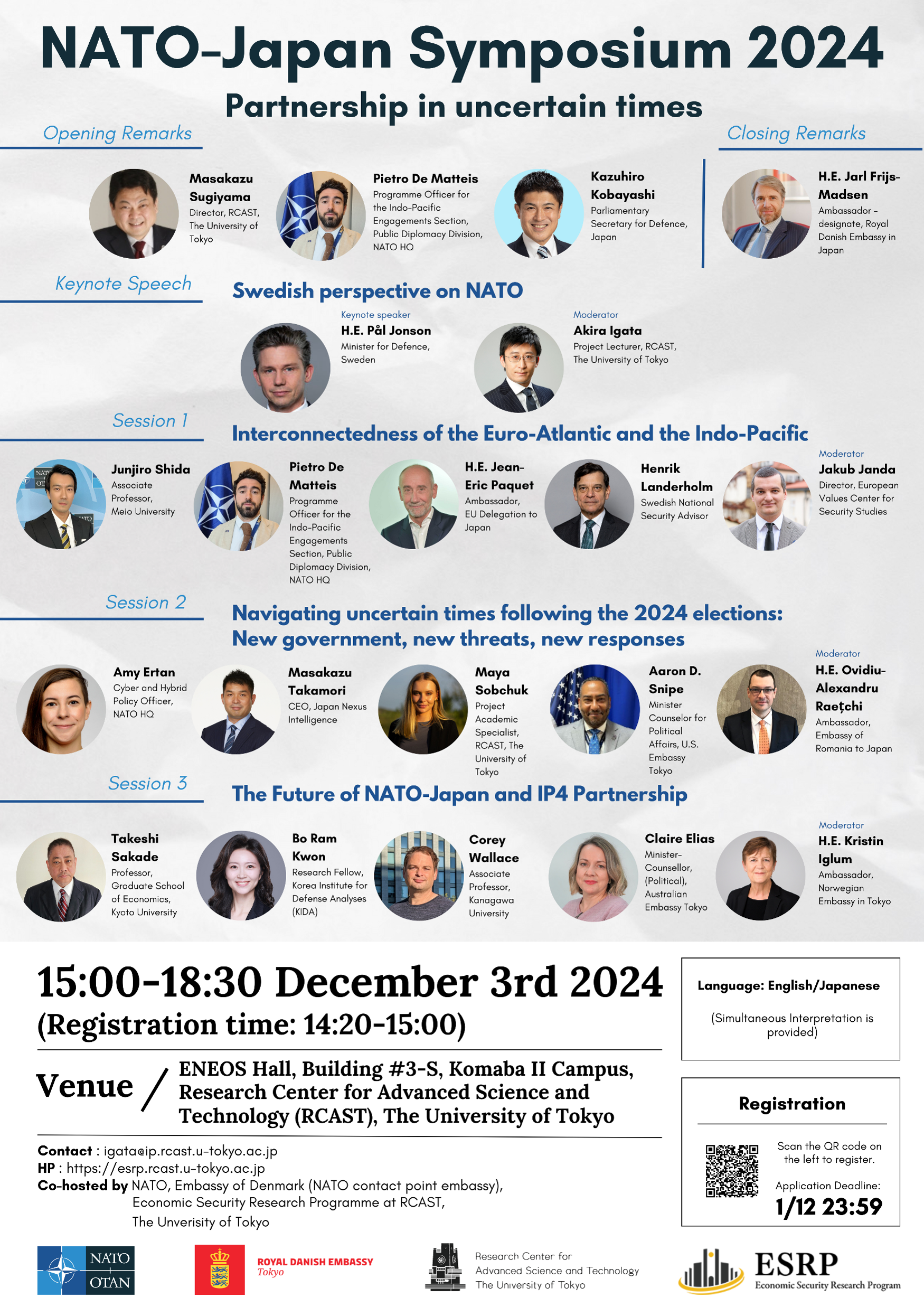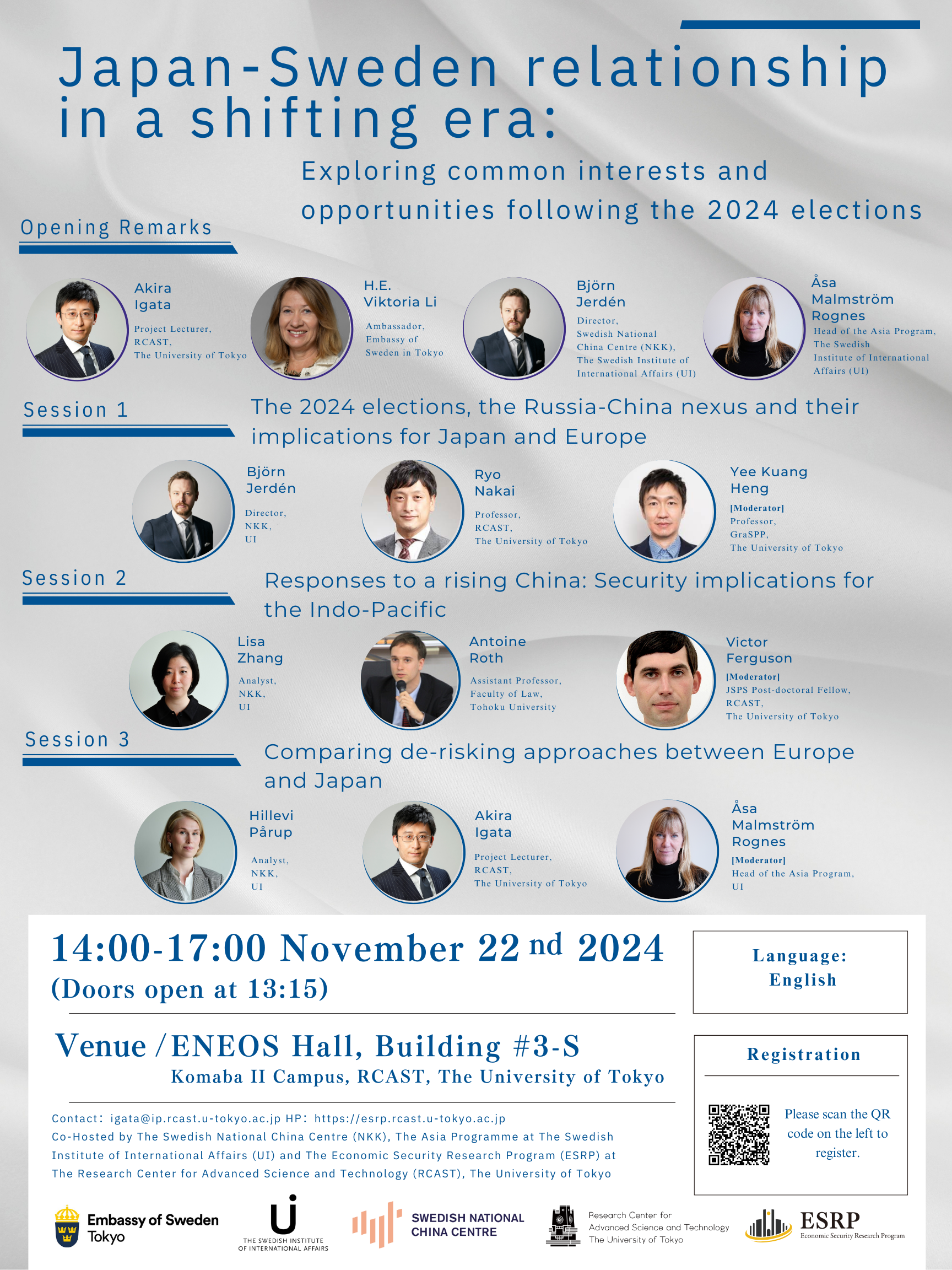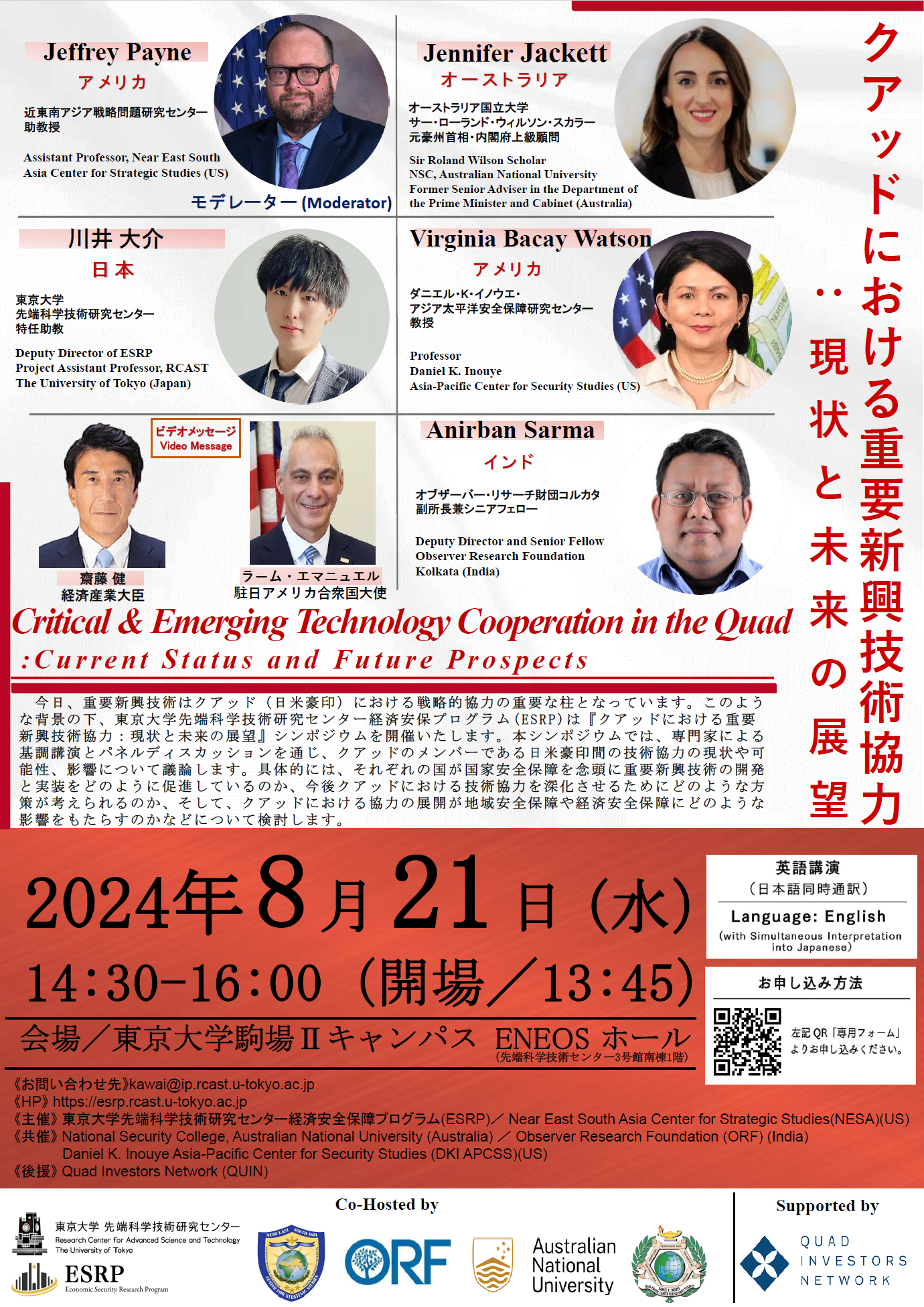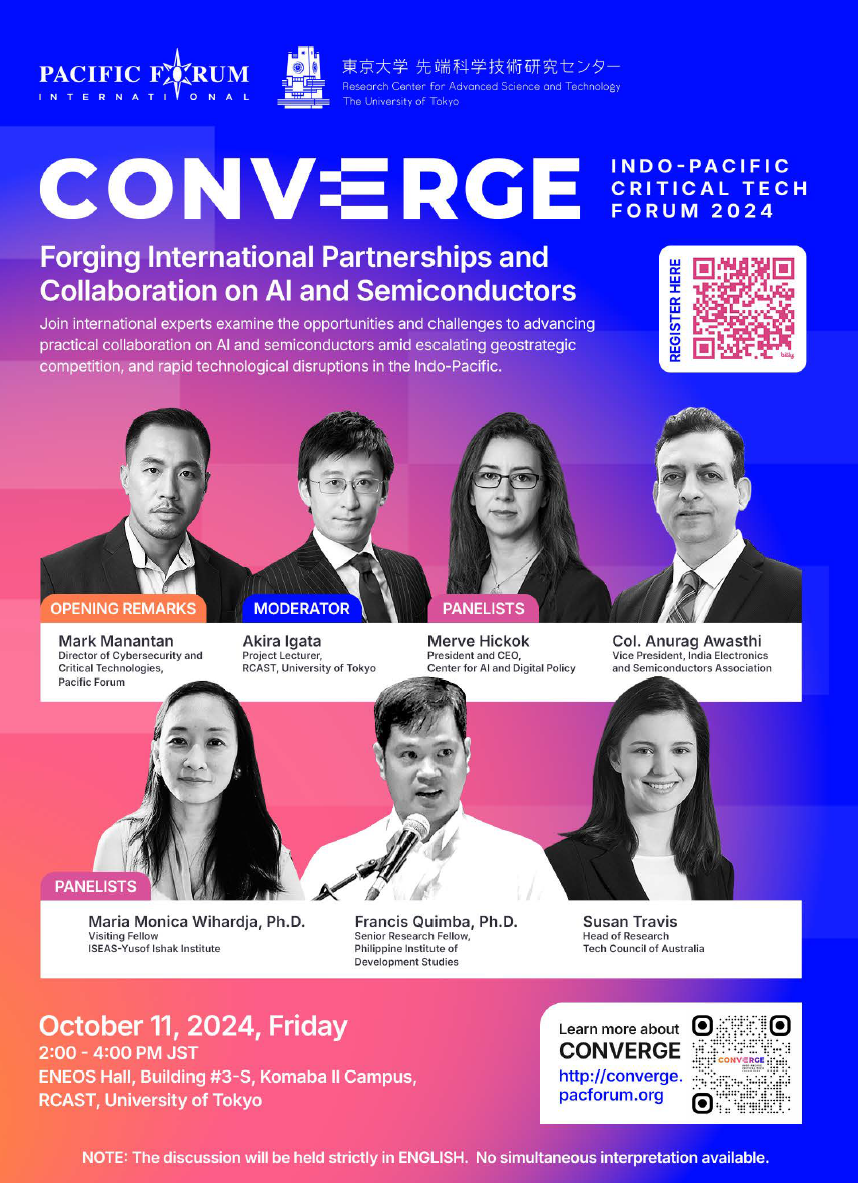Events
CONVERGE: Forging International Partnerships and Collaboration on AI and Semiconductors
The Economic Security Research Program (ESRP) at RCAST, The University of Tokyo and Pacific Forum will co-host a symposium titled "CONVERGE: Forging International Partnerships and Collaboration on AI and Semiconductors" from 14:00-16:00 on Oct.11.
This symposium will bring together experts from 5 countries in the Indo-Pacific - U.S., Australia, India, Singapore, and the Philippines - to discuss how this region can collaborate better on issues related to AI and semiconductors.
We will share some of the outcomes from the closed discussions, where we examined the challenges and opportunities facing different CET actors operating in the Indo-Pacific related to AI and semiconductors. This will allow for the identification of the means to identify best practices for enhancing Indo-Pacific tech cooperation while building trust between existing stakeholders.
The language of this symposium will be in English. Please note that there is NO simultaneous interpretation. Pre-registration required.
Overview of the event
| Date | Oct.11 (Friday), 14:00-16:00 (doors open at 13:15) |
|---|---|
| Place | ENEOS Hall, Building #3-S, Komaba II Campus, Research Center for Advanced Science and Technology, The University of Tokyo 4-6-1 Komaba, Meguro-ku, Tokyo 153-8904 JAPAN [Access](https://www.rcast.u-tokyo.ac.jp/en/access.html) |
| Capacity | 172 people |
| Fee | Free |
| Speakers | 【Panelists】 - [U.S.] Merve Hickok (President and CEO, Center for AI and Digital Policy) - [India] Anurag Awasthi (Vice President of India Electronics and Semiconductors Association) - [The Philippines] Francis Quimba (Senior Research Fellow, Philippine Institute of Development Studies) - [Singapore] Maria Monica Wihardja (Visiting fellow, ISEAS-Yusof Ishak Institute) - [Australia] Susan Travis (Head of Research, Tech Council Australia) |
| Language | English (No simultaneous interpretations) |
| Registration | Please apply from the form bellow. Registration Form |
| Details | Please check this article for more information. |

Economic Security Research Program (ESRP) at the Research Center for Advanced Science and Technology (RCAST) at The University of Tokyo, along with the NATO HQ and the Royal Danish Embassy Tokyo (NATO Contact Point Embassy), will co-host the "NATO-Japan Symposium 2024: Partnership in Uncertain Times."
Following the "NATO-Japan Symposium 2023: Emerging Security Challenges," we will once again convene experts from around the world to RCAST, The University of Tokyo to discuss how partner countries can collaborate with each other in the era where uncertainty reigns.
This year, we have the privilege of welcoming the Swedish Defense Minister to make a keynote speech. This will be followed by a discussion among NATO HQ experts, numerous Ambassadors (EU, Norway, Denmark, Romania), and Japan's Parliamentary Vice Minister of Defense, among others.
We will focus on 3 topics during the discussions. (1) Interconnectedness of the Euro-Atlantic and the Indo-Pacific; (2) Navigating uncertain times following the 2024 elections; New government, new threats, new responses; and (3) The Future of NATO-Japan and IP4 Partnership.

The Economic Security Research Program (ESRP) at The Research Center for Advanced Science and Technology (RCAST), The University of Tokyo and The Swedish National China Centre (NKK) and The Asia Programme at The Swedish Institute of International Affairs (UI) will co-host a symposium, with a backing from the Embassy of Sweden in Tokyo, titled “Japan-Sweden Relationship in a shifting era: Exploring common interests and opportunities following the 2024 elections.”
This symposium will bring together Swedish and Japanese experts on security and economic issues to discuss: (1) How Sweden and Japan perceives the impact of various elections that have taken place in 2024 and the increasing coordination between China and Russia; (2) How Sweden and Japan are responding to the rise of China; and (3) Comparative approaches towards de-risking between Europe and Japan

Taiwan has become a global powerhouse in cutting-edge semiconductor manufacturing and a driving force in the next generation of AI revolution. However, due to its dynamic economic relationship and tense military relations with China, the high-tech island nation has found itself at the forefront of potential global conflict zones since the escalation of the techno-geopolitical era of comprehensive US-China competition.
As economic security becomes an increasingly important element of national security, Taiwan’s experience offers important insights into how the People’s Republic of China (PRC) has advanced its technological power. At the event, Dr. Jeremy Chih Cheng Chang, a research fellow and Director of Semiconductor Policy at DEST, a new launched public think tank in Taiwan, will explain the evolution of Taiwan's economic security framework, exploring historical perspectives and regulatory insights, and discussed lessons learned for international allies.

"Critical & Emerging Technology Cooperation in the Quad" symposium aims to explore the technological cooperation among the four Quad countries—the United States, Australia, India, and Japan—and its impact on regional and economic security. This event will feature keynote speeches and panel discussions by experts, focusing on how each Quad member is promoting the development and implementation of critical and emerging technologies with national security in mind. The discussions will also consider measures to deepen this cooperation and examine the Quad's efforts at the forefront of technological innovation, along with their future prospects.
This event is co-hosted by the Economic Security Research Program (ESRP) at the Research Center for Advanced Science and Technology (RCAST), The University of Tokyo (Japan)and the Near East South Asia Center for Strategic Studies (NESA) (US) in collaboration with the National Security College, Australian National University (Australia); the Observer Research Foundation (ORF) (India); the Daniel K. Inouye Asia-Pacific Center for Security Studies (DKI APCSS) (US), and is endorsed by the Quad Investors Network (QUIN).
Mailing List
The earliest information about the latest event will be delivered.
Please register from the button below.


